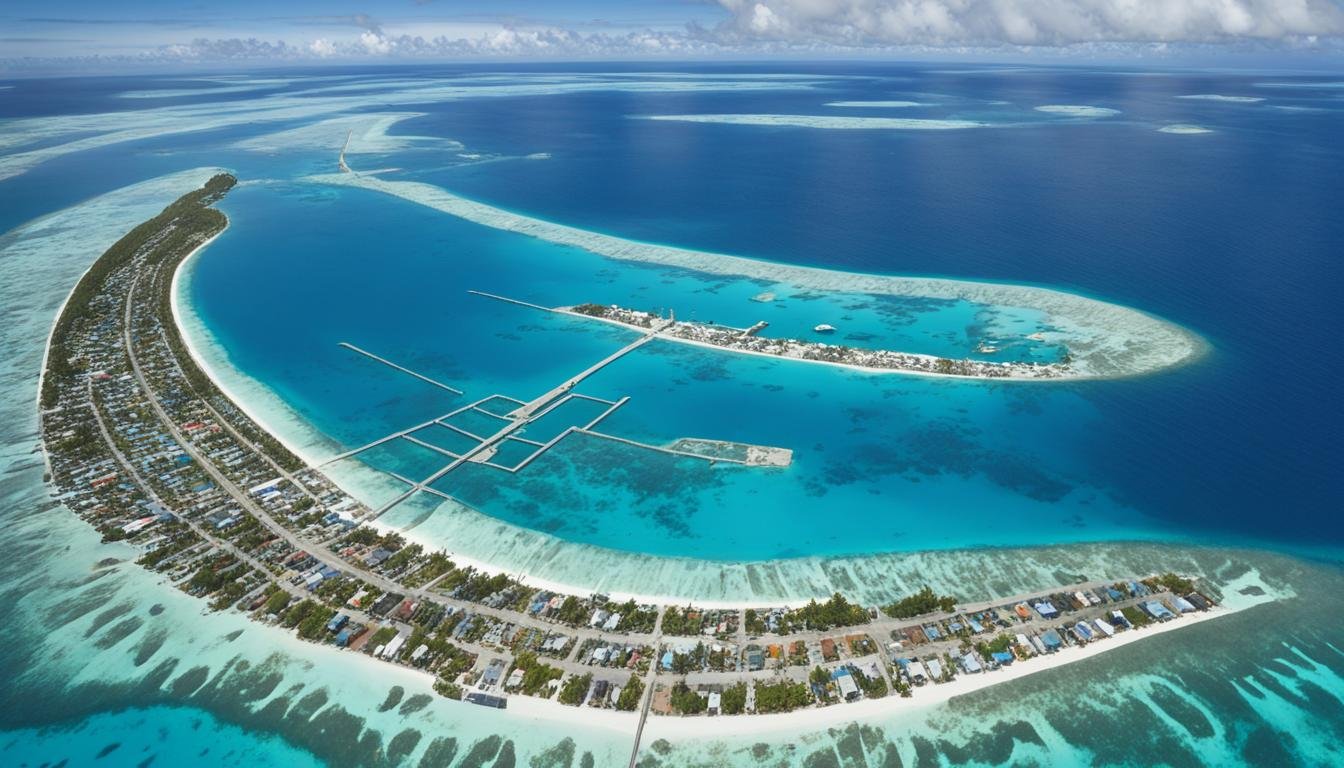Imagine a nation where the entire population could fit inside a single soccer stadium. That’s the reality for Tuvalu, a tiny Pacific island country facing an existential threat from climate change. As sea levels continue to rise, Tuvalu’s land area, barely larger than Washington, D.C., is slowly being swallowed by the ocean.
Despite the daunting challenges, Tuvalu is leading the charge in innovative climate change adaptation strategies. From land reclamation through dredging to advanced topographic and bathymetric surveys, the island nation is fighting to protect its people, land, and sovereignty. This article explores Tuvalu’s remarkable efforts to adapt to the impacts of climate change, with a focus on the initiatives in the capital city of Funafuti.
Key Takeaways
- Tuvalu, a tiny Pacific island nation, is facing an existential threat from climate change and rising sea levels.
- The country is taking innovative measures to adapt and protect its people and land, including land reclamation through dredging.
- Tuvalu is using advanced technologies like LIDAR to collect data for its coastal adaptation projects.
- The country is investing in its youth to build climate resilience and ensure a sustainable future.
- Tuvalu is exploring digital solutions, including the creation of a “digital nation,” to preserve its sovereignty and identity.
Introduction to Climate Change Adaptation in Tuvalu
Tuvalu, a tiny Pacific Island nation, is one of the countries most vulnerable to the devastating effects of climate change. As a low-lying archipelago with a total land area of just 26 square kilometers, Tuvalu faces the looming threat of sea level rise and coastal erosion. The country’s unique geography and limited resources make it imperative to develop innovative adaptation strategies to ensure its long-term resilience.
Tuvalu’s Vulnerability to Climate Change
The impacts of climate change are already being felt in Tuvalu, where rising sea levels have led to the inundation of coastal areas and the salinization of freshwater sources. Coastal erosion has also become a significant problem, threatening the country’s already limited land resources. As a result, Tuvalu has been described as one of the first “environmental refugees” in the face of the global climate crisis.
The Need for Innovative Adaptation Strategies
Recognizing the urgent need to address these challenges, Tuvalu has been at the forefront of developing innovative climate change adaptation strategies. From land reclamation through dredging to advanced topographic and bathymetric surveys, the country is exploring a range of solutions to ensure its long-term survival and the preservation of its cultural identity. By investing in the youth and supporting coastal adaptation initiatives, Tuvalu is working to build a more resilient and sustainable future in the face of the climate change crisis.
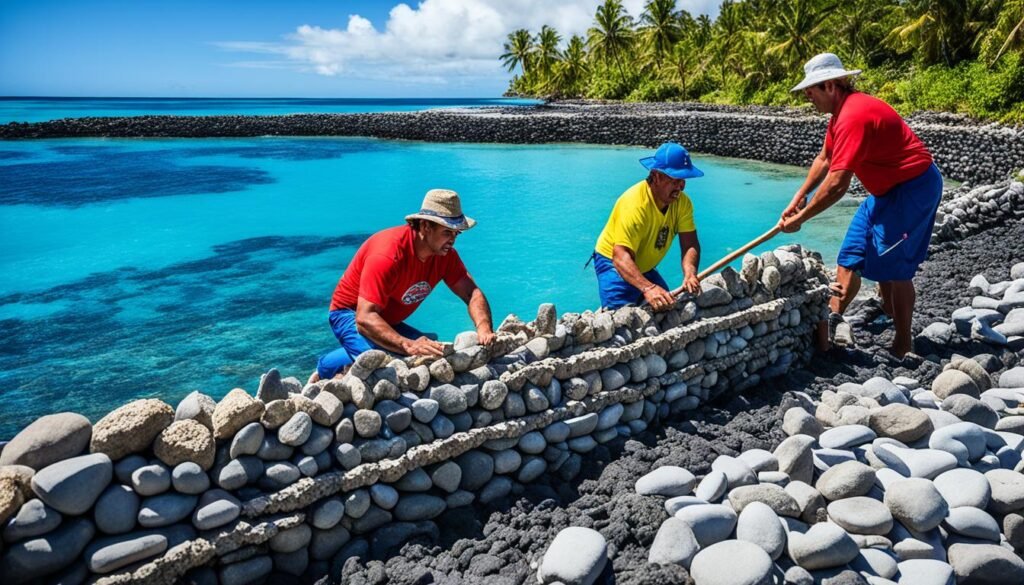
Land Reclamation through Dredging
As an island nation facing the dire consequences of rising sea levels, Tuvalu has turned to innovative land reclamation strategies to combat the effects of climate change. One of the key initiatives undertaken by the Tuvaluan government is the process of dredging, which involves removing sediment and debris from the seafloor and using it to construct new land. This critical process has been implemented in the capital city of Funafuti, as well as the outer islands of Nanumea and Nanumaga.
The Process of Reclaiming Land through Dredging
The land reclamation process in Tuvalu begins with extensive dredging operations. Specialized equipment is used to extract the necessary materials from the seafloor, which are then transported and carefully deposited to create new land areas. This meticulous process not only provides immediate protection against the encroaching sea but also allows for the construction of critical coastal infrastructure, such as seawalls and other adaptation measures.
Benefits of Land Reclamation in Tuvalu
The benefits of land reclamation through dredging in Tuvalu are far-reaching. By increasing the amount of available land, the nation can address the pressing issues of sea level rise, saltwater intrusion, and the need for sustainable infrastructure. This adaptation strategy not only safeguards Tuvalu’s physical territory but also helps to preserve the cultural identity and sovereignty of the island nation as it faces the challenges posed by land reclamation tuvalu, dredging, coastal adaptation, sea level rise, and climate resilience.
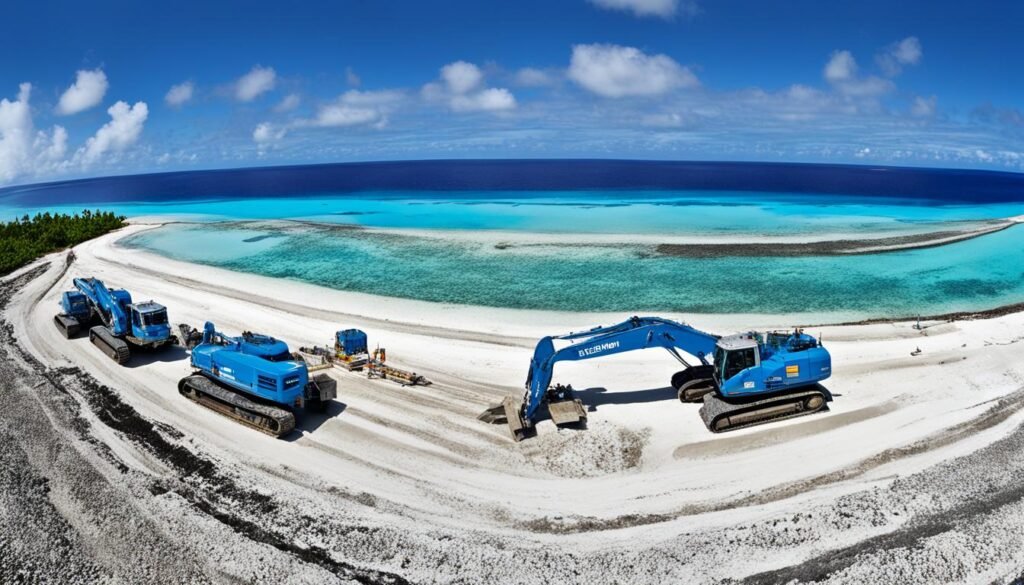
Tuvalu’s Coastal Adaptation Project
The Tuvalu Coastal Adaptation Project (TCAP) is a groundbreaking initiative that aims to enhance the country’s resilience to the impacts of climate change. Funded by the Green Climate Fund and implemented by the United Nations Development Programme (UNDP), this project has been at the forefront of Tuvalu’s efforts to adapt to the changing climate.
At the heart of the TCAP is the goal of reducing Tuvalu’s exposure to coastal hazards and developing a comprehensive long-term adaptation strategy. Through various interventions, the project has been instrumental in driving the country’s climate resilience efforts, including land reclamation, infrastructure development, and capacity building.
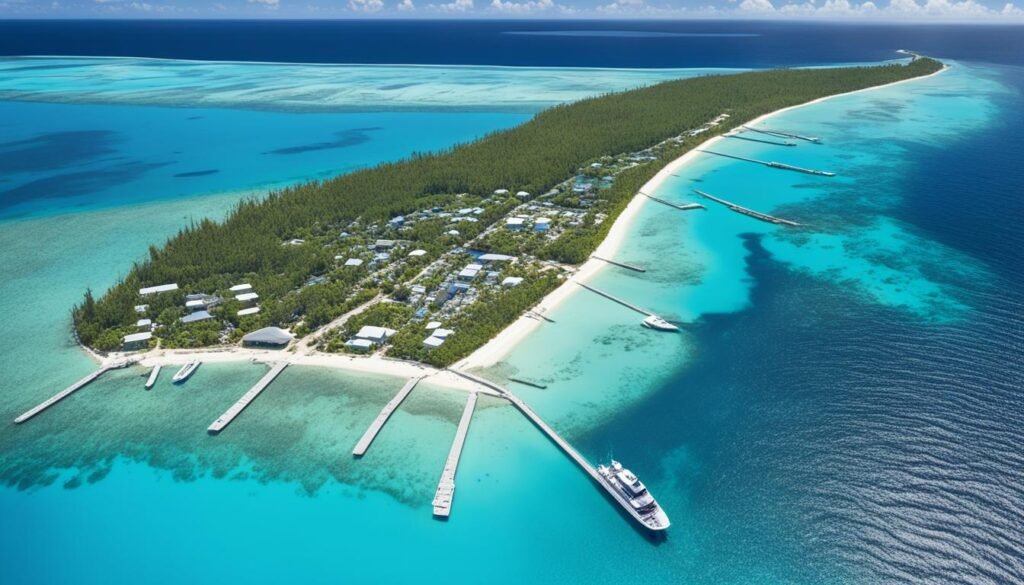
The TCAP has been a game-changer in Tuvalu’s journey towards a more sustainable future. By harnessing the power of the Green Climate Fund and the expertise of the UNDP, the country has been able to implement innovative solutions to the challenges posed by rising sea levels, coastal erosion, and other climate-related threats. This project is a shining example of how collaborative efforts can lead to tangible progress in the fight against climate change.
Advanced Topographic and Bathymetric Surveys
As part of the Tuvalu Coastal Adaptation Project (TCAP), advanced topographic and bathymetric surveys have been conducted across Tuvalu’s nine atoll islands. These surveys utilize cutting-edge lidar technology to collect detailed data on the land surface heights and seafloor depths throughout the nation. This precise information is crucial for informing Tuvalu’s coastal adaptation efforts and designing effective infrastructure to mitigate the impacts of sea level rise.
Use of Lidar Technology for Data Collection
The application of lidar technology in Tuvalu has enabled the creation of highly accurate 3D maps of the islands’ topography and bathymetry. Lidar, or Light Detection and Ranging, is a remote sensing method that uses laser light to measure distances and generate detailed spatial data. By combining lidar data with other geospatial information, Tuvalu’s policymakers and urban planners can make informed decisions to enhance coastal resilience and safeguard the nation’s unique island communities.
The comprehensive topographic and bathymetric surveys conducted through the TCAP provide a robust foundation for Tuvalu’s coastal adaptation strategies. This data-driven approach ensures that the country’s limited resources are allocated efficiently to address the most pressing challenges posed by climate change and rising sea levels.
Supporting Coastal Adaptation Initiatives
In addition to the Tuvalu Coastal Adaptation Project (TCAP), the tiny island nation has been supported by various partners in its efforts to strengthen coastal adaptation and climate resilience. These initiatives aim to promote sustainable development and enhance disaster preparedness as Tuvalu faces the ongoing challenges posed by the climate crisis.
The Pacific Community, a regional development organization, has collaborated with the Tuvaluan government to implement targeted coastal protection measures. These include the use of nature-based solutions, such as mangrove restoration, to safeguard communities from the impacts of sea-level rise and coastal erosion.
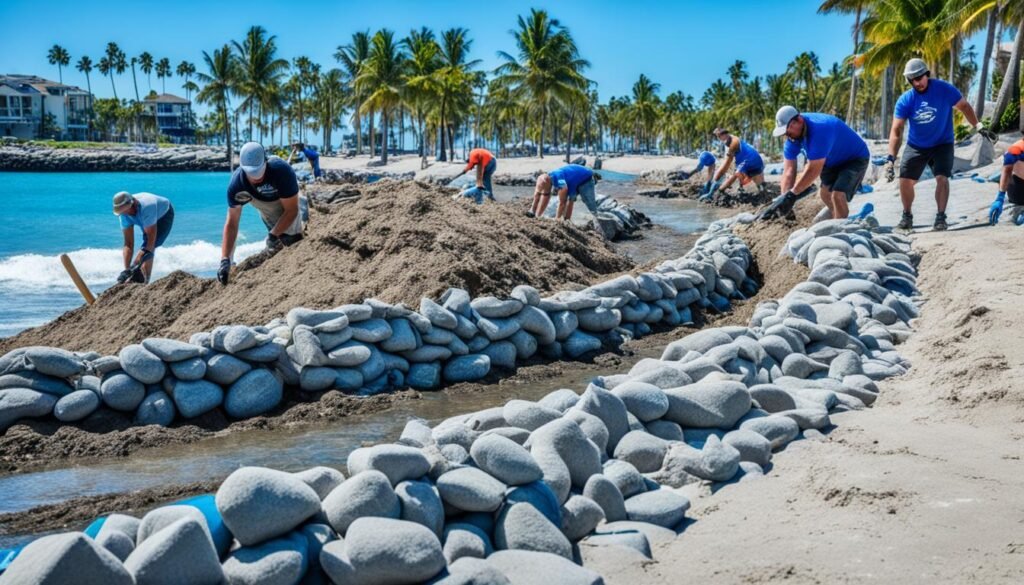
The Government of Australia has also played a crucial role in supporting Tuvalu’s coastal adaptation initiatives. Through funding and technical assistance, Australia has helped the island nation develop and implement strategies to improve its climate resilience and ensure the long-term sustainability of its communities. These efforts encompass a range of interventions, from enhancing early warning systems to strengthening disaster preparedness protocols.
By leveraging the support of its international partners, Tuvalu is demonstrating its commitment to tackling the challenges posed by climate change. These collaborative coastal adaptation initiatives are crucial in enhancing the country’s overall resilience and paving the way for a more sustainable future for its people.
Investing in Youth for Climate Resilience
Tuvalu, a nation facing the imminent threat of climate change, has recognized the crucial role its youth can play in building a resilient future. The country has placed a strong emphasis on empowering young people to become agents of climate adaptation, investing in their education and providing them with opportunities to contribute to the nation’s climate resilience efforts.
Through scholarships and employment opportunities within the Tuvalu Coastal Adaptation Project (TCAP) and other adaptation initiatives, Tuvalu is equipping its youth with the knowledge and skills necessary to lead the country’s climate adaptation efforts. By fostering tuvalu youth climate resilience, the nation aims to ensure a sustainable and self-reliant future, where its young people are at the forefront of climate adaptation and capacity building.
This investment in education and youth empowerment not only strengthens Tuvalu’s climate resilience but also cultivates a sense of ownership and responsibility among the younger generation. As they gain practical experience and contribute to the nation’s adaptation strategies, these young climate champions will be positioned to lead Tuvalu’s transition towards a more sustainable and climate-resilient future.
Tuvalu: Climate change adaptation Funafuti Tuvalu
As a small, low-lying island nation, Tuvalu faces unique challenges in its climate change adaptation efforts. The country’s sovereignty and the preservation of its cultural identity are threatened by the prospect of rising sea levels and potential relocation of its population. Tuvalu is exploring innovative strategies to safeguard its national identity and territorial integrity in the face of the climate crisis.
Tuvalu’s Unique Adaptation Challenges
Tuvalu’s status as a low-lying island nation makes it particularly vulnerable to the impacts of climate change, such as sea level rise and coastal erosion. The country’s small size and limited resources pose significant obstacles to effective climate adaptation. Moreover, the threat of becoming environmental refugees has profound implications for Tuvalu’s sovereignty and identity.
Strategies for Preserving Sovereignty and Identity
To address these daunting challenges, Tuvalu is implementing various strategies to preserve its sovereignty and cultural identity. Land reclamation through dredging, for instance, aims to expand the country’s habitable land and safeguard its territorial integrity. Additionally, Tuvalu’s Digital Nation Initiative explores innovative ways to maintain its national identity, even in the face of potential relocation or displacement due to climate change.
By exploring these innovative solutions, Tuvalu is demonstrating its resilience and determination to protect its sovereignty and unique identity as a small island nation confronting the devastating effects of climate change. The strategies employed by Tuvalu can serve as a model for other low-lying island countries facing similar challenges.
The Digital Nation Initiative
In a groundbreaking move, Tuvalu has announced its intention to become the world’s first digital nation. Through a partnership with Accenture, Tuvalu is creating a 3D representation of the country in the metaverse. This innovative Tuvalu digital nation initiative aims to preserve the country’s national identity, serve as a hub for global collaboration on climate adaptation, and safeguard its cultural heritage, even as the physical land is threatened by rising sea levels.
Creating Tuvalu in the Metaverse
By building a digital version of Tuvalu in the metaverse, the country is taking a bold step to ensure the survival of its cultural and national identity. This virtual representation will allow Tuvaluans and people around the world to engage with and experience the nation’s unique heritage, even as the physical islands face the challenges of climate change.
Benefits of the Digital Nation Initiative
The Tuvalu digital nation initiative offers numerous benefits, including the ability to preserve cultural artifacts and traditions, facilitate global collaboration on climate adaptation strategies, and provide a platform for economic and educational opportunities. By embracing the metaverse, Tuvalu is positioning itself as a leader in the digital age, ensuring its voice and identity remain strong in the face of the ever-evolving global landscape.
Long-Term Adaptation Plan (L-TAP)
Recognizing the urgent need for a comprehensive, long-term approach to climate adaptation, Tuvalu has developed the “Te Lafiga o Tuvalu” (Tuvalu’s Refuge) Long-Term Adaptation Plan (L-TAP). This visionary plan aims to create a resilient future for the nation by reclaiming and elevating 3.6 square kilometers of land, providing a safe and sustainable haven for the people of Tuvalu amidst the escalating threats of sea level rise and climate change.
Vision for Raised, Safe Land and Infrastructure
At the heart of Tuvalu’s L-TAP is the ambitious goal of constructing a network of elevated, climate-resilient islands and infrastructure. The plan envisions the creation of a sustainable community with renewable energy sources, reliable water supplies, and modern public services, all designed to withstand the impacts of sea level rise and extreme weather events. This bold, science-based strategy represents Tuvalu’s unwavering commitment to safeguarding its sovereignty, identity, and the future of its people in the face of the climate crisis.
By investing in the Tuvalu Long-Term Adaptation Plan (L-TAP), the nation is taking a proactive approach to coastal adaptation and sustainable development, ensuring its resilience and habitability for generations to come. This comprehensive plan serves as a model for other small island nations grappling with the formidable challenges posed by sea level rise and climate change.
Conclusion
Tuvalu’s climate change adaptation efforts in Funafuti and across the country demonstrate the country’s unwavering commitment to preserving its land, people, and cultural identity in the face of the existential threat posed by climate change. From innovative land reclamation projects to the pioneering Digital Nation Initiative and the Long-Term Adaptation Plan, Tuvalu is leading the way in developing innovative solutions to address the impacts of rising sea levels and coastal erosion.
As a small nation with an outsized voice on the global stage, Tuvalu’s resilience and adaptation strategies serve as a model for other vulnerable countries and inspire the world to take decisive action against the climate crisis. Tuvalu’s commitment to tuvalu climate adaptation, climate resilience, sustainable development, and global leadership is a testament to its determination to safeguard its future and inspire others to follow suit.
Tuvalu’s innovative approaches to climate change adaptation, from dredging and land reclamation to the creation of a digital nation, demonstrate the country’s ability to adapt and thrive in the face of adversity. These efforts, coupled with the Long-Term Adaptation Plan, provide a comprehensive framework for Tuvalu to secure its future and preserve its unique cultural identity, setting an example for other vulnerable nations to emulate.
Source Links
- Rising Tides, Rising Solutions: Tuvalu’s Innovative Climate Adaptation Strategies – https://thediplomat.com/2023/11/rising-tides-rising-solutions-tuvalus-innovative-climate-adaptation-strategies/
- Tuvalu Coastal Adaptation Project | UNDP Climate Change Adaptation – https://adaptation-undp.org/projects/tuvalu-coastal-adaptation-project
- Notes from Tuvalu: Leading the way in adapting to sea-level rise – https://www.undp.org/blog/notes-tuvalu-leading-way-adapting-sea-level-rise
